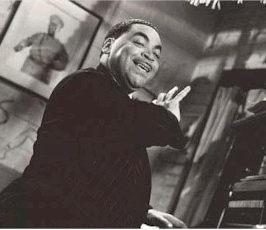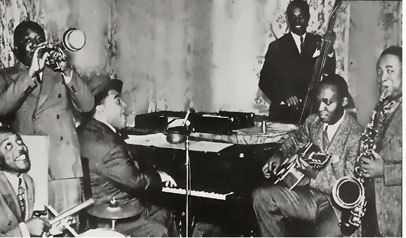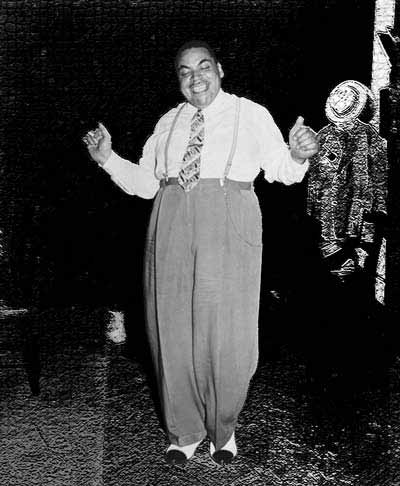
Pianist Fats Waller. Photo courtesy Rutgers Institute of Jazz Studies.
He called himself “the harmful little armful” but there was nothing little about Fats Waller. His high voltage personality would stun you, to say nothing of his 285-pound body, draped in carefully-tailored Savile Row suits. He was surprisingly sexy and charming: a fast-talking wit, clowning at the keyboards, "sending up" his audiences and burlesquing himself.
Fats found out early that playing the over-sized buffoon would keep him in the limelight, earning him top dollar. His 1930s recordings for the RCA Bluebird label—most of them evoking a rollicking house-party mood being produced "off the cuff" in one take and without rehearsal—sold in the millions.
But musicians and some of his fans knew that underneath the clowning, Fats Waller possessed an astounding musical depth. Under the guidance of his famous teacher, James P. Johnson, Waller acquired an impeccable and assured piano technique and a refined sense of swinging time. Through his friend George Gershwin, he had a rare opportunity to study advanced harmony, counterpoint and composition with Leopold Godowsky.

Fats and His Rhythm. Photo courtesy redhotjazz.
On our Riverwalk Jazz broadcast this week we focus on Fats Waller, the composer. Fats wrote over 500 compositions in his short twenty-year career. His friend, the lyricist Andy Razaf, said that “music poured out of Fats like water."

Fats Waller. Photo courtesy Rutgers Institute of Jazz Studies.
The music Fats Waller is still known and loved for is full of infectious swinging rhythms and happy, catchy melodies—tunes like "Honeysuckle Rose," "Ain’t Misbehavin'" and "Your Feet's Too Big." Lesser-known are his complex and masterful solo piano pieces of which some, like "Viper’s Drag," "Numb Fumblin'" and "Clothesline Ballet," were inspired by the legendary stride piano "cutting contests" often held at Harlem "rent parties."
In addition to his virtuoso pianistic accomplishments evident on Fats' solo recordings, Waller ranks as one of the great composers of the golden age of American Popular Song. Lesser-known songs such as "Willow Tree" and "My Fate Is in Your Hands," written for the stage, have a wistful, bittersweet quality.
Fats said, "It is my contention, and always has been, that the thing that makes a tune click is the melody, and give the public four bars of that to dig their teeth into, and you have a killer-diller...It's melody that gives variety to the ear."
Photo credit for Home Page: Fats Waller. Photo courtesy musicradar.
Text based on Riverwalk Jazz script by Margaret Pick ©2011

